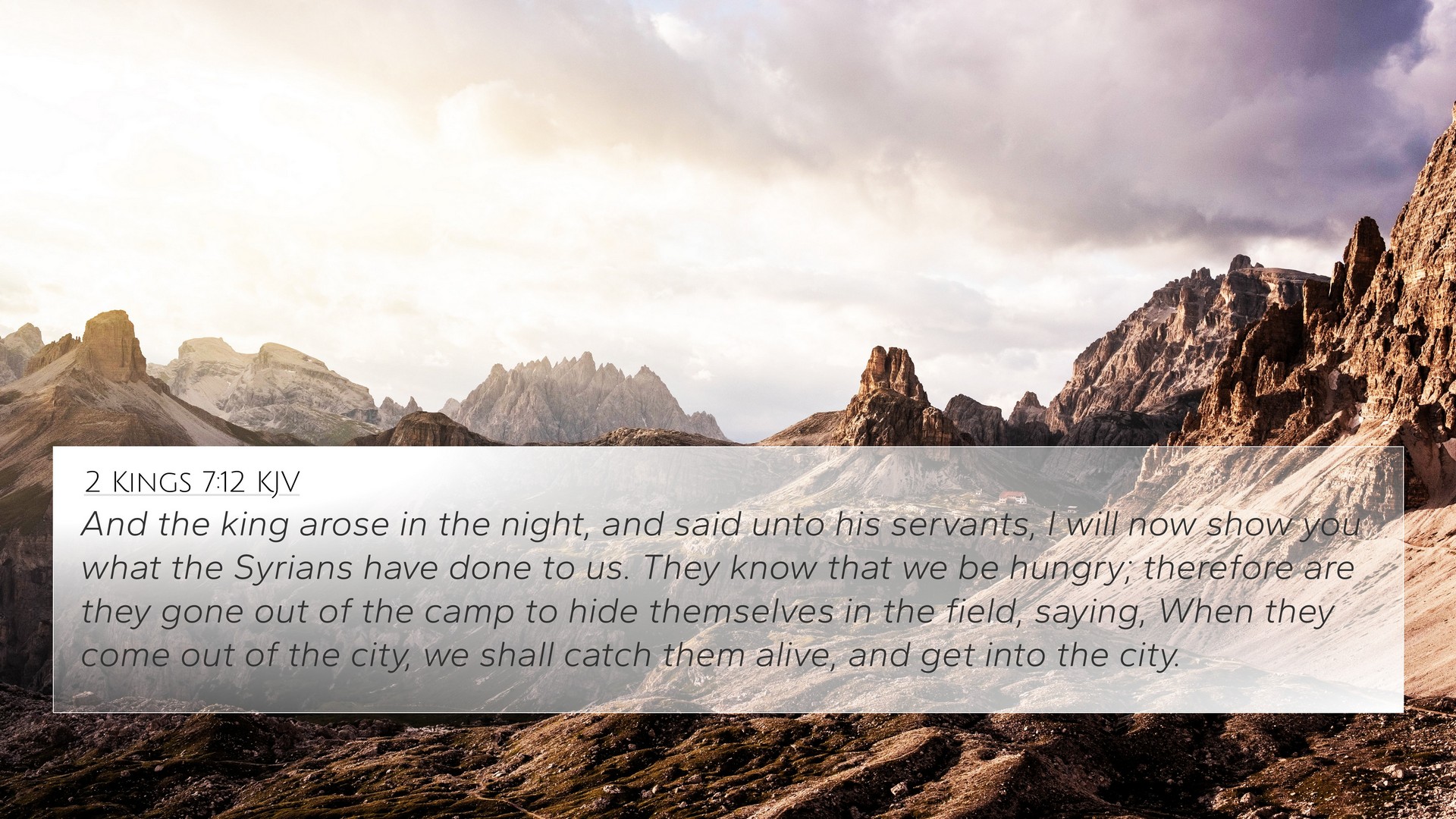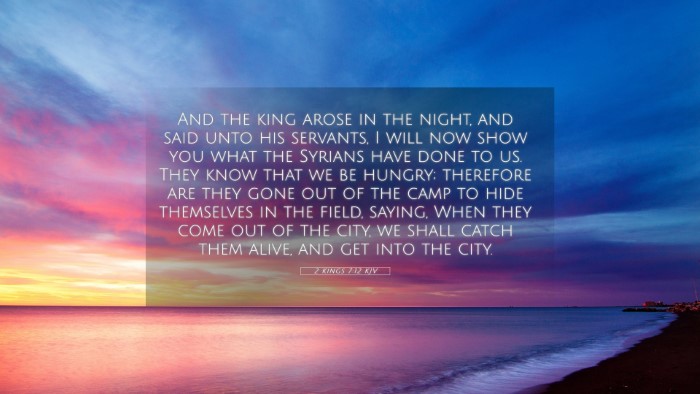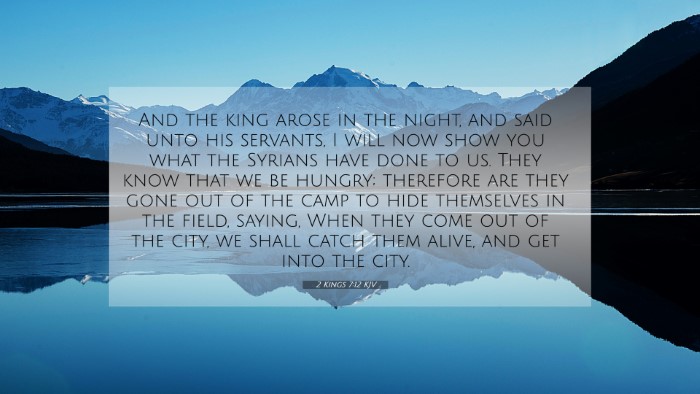Old Testament
Genesis Exodus Leviticus Numbers Deuteronomy Joshua Judges Ruth 1 Samuel 2 Samuel 1 Kings 2 Kings 1 Chronicles 2 Chronicles Ezra Nehemiah Esther Job Psalms Proverbs Ecclesiastes Song of Solomon Isaiah Jeremiah Lamentations Ezekiel Daniel Hosea Joel Amos Obadiah Jonah Micah Nahum Habakkuk Zephaniah Haggai Zechariah Malachi2 Kings 7:12 Similar Verses
2 Kings 7:12 Cross References
And the king arose in the night, and said unto his servants, I will now show you what the Syrians have done to us. They know that we be hungry; therefore are they gone out of the camp to hide themselves in the field, saying, When they come out of the city, we shall catch them alive, and get into the city.
Uncover the Rich Themes and Topics of This Bible Verse
Listed below are the Bible themes associated with 2 Kings 7:12. We invite you to explore each theme to gain deeper insights into the Scriptures.
2 Kings 7:12 Cross Reference Verses
This section features a detailed cross-reference designed to enrich your understanding of the Scriptures. Below, you will find carefully selected verses that echo the themes and teachings related to 2 Kings 7:12 KJV. Click on any image to explore detailed analyses of related Bible verses and uncover deeper theological insights.
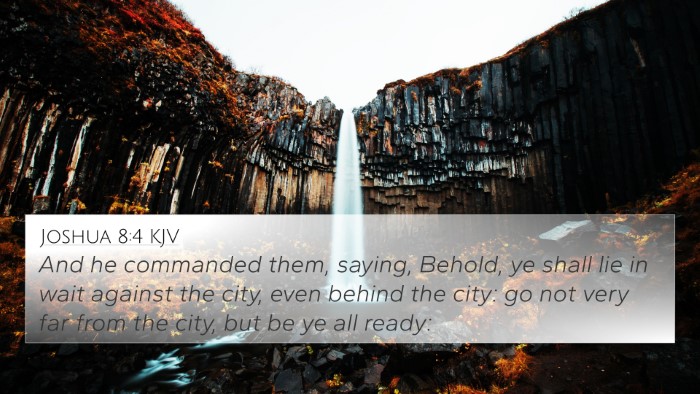
Joshua 8:4 (KJV) »
And he commanded them, saying, Behold, ye shall lie in wait against the city, even behind the city: go not very far from the city, but be ye all ready:
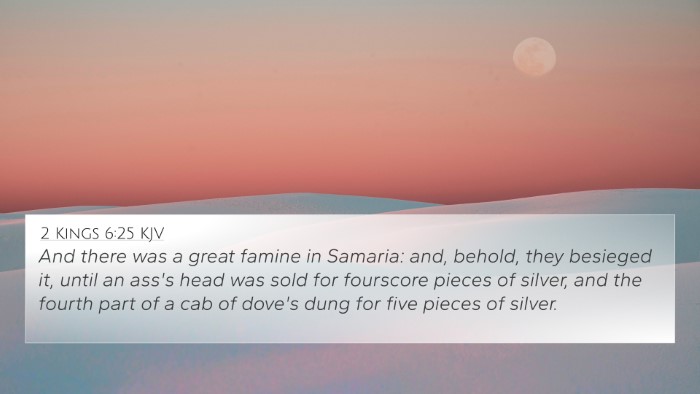
2 Kings 6:25 (KJV) »
And there was a great famine in Samaria: and, behold, they besieged it, until an ass's head was sold for fourscore pieces of silver, and the fourth part of a cab of dove's dung for five pieces of silver.
2 Kings 7:12 Verse Analysis and Similar Verses
Understanding 2 Kings 7:12
Verse: 2 Kings 7:12 - "And the king arose in the night, and said unto his servants, I will now show you what the Syrians have done to us." (KJV)
Summary of Meaning
The significance of 2 Kings 7:12 is deeply rooted in the historical context of Israel's struggle against their enemies, particularly the Syrians. At this point in the narrative, the city of Samaria is besieged, leading to extreme famine and despair among the people. The king's proclamation reflects a moment of revelation and realization regarding the Syrians' intentions, signaling a turning point in the siege.
Commentary Insights
-
Matthew Henry's Commentary:
Henry emphasizes the importance of recognizing God's providence even in dire circumstances. The king's dialogue with his servants highlights the need for discernment in times of stress. He reflects on the Syrian's strategy and the fear that had gripped the Israelites and suggests that understanding the enemy’s tactics is crucial for survival.
-
Albert Barnes' Notes:
Barnes interprets this verse as an illustration of God's power to deliver His people, even when they least expect it. The king’s overnight concern reveals his shift from despair to strategic thinking, acknowledging that understanding the situation can lead to a path of deliverance. Barnes also points out how this moment is pivotal for the city's future safety.
-
Adam Clarke's Commentary:
Clarke focuses on the psychology of leadership in crisis. He notes that the king’s decision to consult his servants signifies a willingness to listen and adapt. This response not only shows the king's perceptiveness but also the collective effort needed to combat the looming threat of the Syrians.
Cross-References
2 Kings 7:12 is connected to several other Bible verses that provide deeper insights into its significance:
- 1 Kings 20:1-30: This passage discusses previous battles with the Syrians and underlines God's sovereignty over Israel's enemies.
- 2 Kings 6:24-29: Here, the siege of Samaria is elaborated, giving context to the dire conditions prompting the king's worries.
- Psalm 34:19: "Many are the afflictions of the righteous: but the LORD delivereth him out of them all." This verse echoes the theme of divine deliverance in challenging times.
- Isaiah 59:19: "So shall they fear the name of the LORD from the west, and his glory from the rising of the sun." This highlights the reverence for God's power against adversities.
- Ephesians 6:12: Discusses our struggle not against flesh and blood, paralleling the unseen spiritual realities at play in this earthly conflict.
- Hebrews 11:32-34: Mentions the faith of the judges and leaders in Israel, encouraging believers to realize God’s continued provision through faith and wise leadership.
- Jeremiah 17:7-8: God's promise of support to those who trust in Him serves to reinforce the assurance of deliverance amidst fears.
Thematic Connections
This verse exemplifies themes of leadership, divine intervention, and the importance of collective wisdom during crises:
- Leadership in Crisis: The king's ability to rise and consult his servants emphasizes the necessity of cooperative leadership.
- Strategic Awareness: Understanding the situation surrounding them fosters faith and does not succumb to despair.
- Divine Preservation: The assurance of faith in God’s deliverance becomes clear as the narrative unfolds, promising relief from siege conditions.
Inter-Biblical Dialogue
In the greater narrative of the Bible, this king's actions and thoughts resonate with various biblical principles:
- Throughout scripture, God’s deliverance is a recurring theme, seen in various leaders like Moses and David, who similarly faced dire situations.
- The prevalence of fear and despair that can lead to a lack of faith appears throughout the narratives, urging believers to remain steadfast in challenging times.
- Connections between the Old Testament narratives and the New Testament teachings highlight that while contexts may differ, God’s faithfulness remains constant.
Conclusion
2 Kings 7:12 serves as a powerful reminder of the necessity to maintain awareness and engage in thoughtful consideration when facing adversities. Insights from public domain commentaries emphasize the relevancy of discernment, faith, and collective effort, making this scripture a vital part of the broader biblical discourse. By engaging in cross-referencing, readers can connect this narrative to deeper themes of deliverance, leadership, and faith, enriching their understanding of God's workings through historical contexts.
